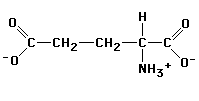The majority of studies examining glutamine's effects on protein synthesis and protein breakdown use glutamine infusion as their delivery method. Infusing or injecting glutamine will lead to greater plasma concentrations of glutamine as well as a more rapid appearance of the glutamine in the bloodstream, which means the results found in the study may or may not totally apply to oral glutamine supplementation.
In addition to this, about half of orally absorbed glutamine is used by the intestines (specifically the gut mucosal cells), liver and kidneys, causing many to believe oral glutamine supplementation is not economical to use.
In this article, we are first going to look at the roles/metabolic properties glutamine has in the human body and then examine the results of the currently available studies on the effects oral glutamine supplementation has on subjects.
| RELATED ARTICLE | ||
|

What Does Glutamine Do In The Body? 
Glutamine is a glucogenic (glucose creating), nonessential amino acid that has multiple roles in the body. Glutamine is synthesized mainly in skeletal muscle and the liver and acts as a "nitrogen shuttle" between organs, a fuel for cells of the immune system and intestines, and a precursor for nucleotide synthesis (Holecek, 2002).

Glutamine Molecule.
Glutamine is also a powerful cell volumizer (Haussinger et al. 1993). An increase in cell volume, also called cell swelling, stimulates anabolic pathways (synthesis of proteins and glycogen) and inhibits catabolic pathways (protein degradation) (Haussinger, 1993).
According to Houston (2001), "Glutamine content in skeletal muscle and other tissues appears to have a regulatory role in whole body protein synthesis." Glutamine levels inside muscle govern protein synthesis and nitrogen balance and therefore muscle growth (VanAcker et al. 1999).
Adequate glutamine concentrations are needed for optimal health and skeletal muscle hypertrophy. Therefore one would want to keep glutamine levels elevated, especially during/post exercise.

Glutamine Metabolism & Exercise
| RELATED ARTICLE | ||
|
During times of stress, such as exercise, skeletal muscle glutamine levels are depleted. This glutamine released from skeletal muscle is derived from muscle proteins, the intramuscular free amino acid pool and newly synthesized glutamine (VanAcker, 1999). The newly synthesized glutamine is created by using BCAA's obtained from muscle protein breakdown (Holecek, 2002).
Plasma and muscle glutamine levels are decreased post workout and it can take hours before they are restored (Rowbottom, 1996). A study examining the effect of free-form glutamine and glutamine peptide ingestion on muscle glycogen resynthesis found that plasma glutamine was decreased by 20% post workout with the ingestion of glucose only (control), showed no change with ingestion of whey protein or wheat protein hydrolysate plus glucose drinks, and a 200% increase with ingestion of free-form glutamine plus glucose drink (VanHall, 2000). Free-form glutamine supplementation was needed to elevate plasma glutamine levels post workout.
In addition to restoring and elevating plasma glutamine levels, oral glutamine supplementation increases muscle glycogen storage to the same capacity as glucose (Bowtell, 1999).

Oral Glutamine Supplementation Bioavailability
Glutamine serves as a vital fuel for the gut, causing some to be skeptical of oral glutamine bioavailability. Bowtell et al. (1999) found that 46% of an 8 gram oral dosage of glutamine reached the blood stream while 53% of the dose was metabolized in the gut, liver and kidneys.
Having 53% of the glutamine absorbed by the gut, liver and kidneys may sound like a bad thing, but remember glutamine serves as a fuel for these tissues and their demand for glutamine is increased during times of stress (VanAcker et al. 1999). By supply exogenous glutamine to these tissues less glutamine will be needed from skeletal muscle to meet the body's glutamine demand.
Studies show that oral glutamine supplementation increases plasma glutamine levels. Due to the fact that skeletal muscle and plasma glutamine levels are depleted during exercise supplementing with exogenous glutamine is beneficial.
More research needs to be done to obtain more information on the effects of orally absorbed glutamine on skeletal muscle protein synthesis rates, but if you look the findings presented in this article, it is reasonable to assume supplemental glutamine will have positive effects on protein synthesis levels due to its ability to increase plasma glutamine levels.
 View Top Selling Glutamine Products Here.
View Top Selling Glutamine Products Here.
References:
Bowtell JL, Gelly K, Jackman ML, Patel A, Simeoni M, Rennie MJ. Effect of oral glutamine on whole body carbohydrate storage during recovery from exhaustive exercise.
J Appl Physiol. 1999 Jun;86(6):1770-7.
2. Haussinger D et al. Cellular hydration state: An important determinant of protein catabolism in health and disease. Lancet 341:1330-1332.1993.
3. Holecek M. Relation between glutamine, branched-chain amino acids, and protein metabolism. Nutrition. 2002 Feb;18(2):130-3. Review.
4. Rennie, M. J., A. Ahmed, S. E. O. Khogali, S. Y. Low, H. S. Hundal, and P. M. Taylor. Glutamine metabolism and transport in skeletal muscle and heart and their clinical relevance. J. Nutr. 126: 1142S-1149S, 1996.
5. Rowbottom DG, Keast D, Morton AR. The emerging role of glutamine as an indicator of exercise stress and overtraining. Sports Med. 1996 Feb;21(2):80-97. Review.
6. VanAcker BA,.et al. (1999) Glutamine:the pivot of our nitrogen economy? JPEN, 23:S45-8.
7. Van Hall G, Saris WH, van de Schoor PA, Wagenmakers AJ. The effect of free glutamine and peptide ingestion on the rate of muscle glycogen resynthesis in man. Int J Sports Med. 2000 Jan;21(1):25-30.


